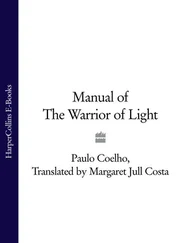She’s not much interested in these theories. “Begin, then. I’ll go with you.”
“No, you won’t. You may be holding me in your arms, but you don’t know where I’m going. Don’t do it. Promise me you won’t imagine the ring. Even if I don’t find a complete solution, I promise I’ll tell you where I met you before. I don’t know that it was the first time this happened in all my past lives, but it’s the only one I’m sure of.”
She doesn’t answer.
“Promise,” I insist. “Today, I tried to take you back to the Aleph, but there were people there. That means I must go there before you do.”
She releases me from her embrace and makes as if to get up. I hold on to her.
“Let’s go to the Aleph now,” she says. “There won’t be anyone around at this hour.”
“Please believe me. Embrace me again and try not to move too much, even if you have difficulty sleeping. Let me see if I can get an answer first. Light the sacred fire on the mountain, because the place I’m going to is as cold as death.”
“I’m one of the women, aren’t I?” Hilal says again.
“Yes,” I say, still listening to her heart beating.
“I’ll light the fire and stay here to watch over you. Go in peace.”
I imagine the ring. Her earlier forgiveness leaves me freer, and soon the ring is moving up and down my body of its own accord, propelling me toward the place I do not want to go but to which I must return.
I LOOK UP from the letter and observe the elegant couple before me. The man is wearing a spotless white linen shirt and a velvet jacket with gold embroidery on the sleeves. The woman has on a fur jacket, and the woolen bodice of her dress is sewn with pearls while the high embroidered collar of her long-sleeved white blouse frames her anxious face. They are talking to my Superior.
“We’ve been friends for years,” she says, giving a forced smile, as if she wanted to convince us that nothing has changed, that this is all a misunderstanding. “You baptized her and set her on the path to righteousness.”
Then, turning to me, she adds, “And you know her better than anyone. You played together and grew up together and only grew apart when you chose to enter the priesthood.”
The Inquisitor remains impassive.
The couple look at me with pleading eyes, begging for my help. I have often slept in their house and eaten their food. They took me in after my parents died from the plague. I nod in agreement. I am five years older, but it’s true that I know her better than anyone. We did indeed play together and grow up together and, before I entered the Dominican Order, she was the woman with whom I would have liked to spend the rest of my days.
“We’re not talking about her friends.” It is her father’s turn to address the Inquisitor, and the smile on his face is equally false. “I don’t know what they do or what they have done. I believe the Church has a duty to put an end to heresy, just as it put an end to the threat from the Moors. These women must be guilty, because the Church is never unjust, but you both know that our daughter is innocent.”
The order’s superiors had arrived in town the previous day for their yearly visit. All the inhabitants had gathered in the main square. They were under no obligation to do this, but anyone who failed to appear was immediately viewed as suspect. Families of all social classes crowded together in front of the church, and one of the Superiors read out a document explaining the reason for the visit: to unmask heretics and lead them to earthly and divine justice. Then came the moment of mercy, when people who felt they had shown a lack of respect for divine dogma could confess spontaneously to their sins and receive only a mild punishment. However, despite the terror in everyone’s eyes, no one moved.
Then the crowd was asked to denounce any suspicious activities. A farm laborer had stepped forward and named each of the eight girls. He was a man known to beat his own daughters but who always attended Sunday Mass, as if he were an innocent lamb of God.
The Inquisitor turns to me and nods, and I immediately hold out the letter to him. He places it next to a pile of books.
The couple wait. Despite the cold, the father’s forehead is shiny with sweat.
“None of our family took a step forward because we are God-fearing people. We haven’t come here to save all the girls; we just want our daughter back. I promise by all that’s holy that we’ll send her straight to a convent as soon as she’s sixteen. Her body and soul will have but one goal: devotion to the Divine Majesty.”
“That man made his accusation in front of the whole town,” the Inquisitor says at last. “He risks public disgrace if he is found to be lying. Most denunciations are made anonymously. Such bravery is rare.”
Relieved that the Inquisitor has at least broken his silence, the girl’s father thinks that perhaps there is a chance to negotiate.
“He’s an enemy of mine, you know that. I dismissed him from his job because he coveted my daughter. It’s pure revenge on his part, and nothing to do with faith.”
He would like to add that the same is true of the other seven accused. There are rumors that this same farm laborer has had sexual relations with two of his own daughters. He’s a pervert who can find pleasure only in sex with young girls.
The Inquisitor removes a book from a pile on the table.
“I would like to believe that, and I’m prepared to be shown that this is the case, but I have to follow the correct procedures. If she is innocent, she has nothing to fear. Nothing, absolutely nothing, will be done that is not written down here. True, we did commit certain excesses at the beginning, but we are more organized and more careful. No one ever dies at our hand now.”
He holds out the book: Directorium Inquisitorum . The girl’s father takes it but does not open it. He grips it hard, as if to conceal the fact that his hands are trembling.
“It contains our code of conduct,” the Inquisitor goes on. “The roots of the Christian faith. The perverse ways of heretics. And how we should distinguish one from the other.”
The woman raises one hand to her mouth, trying to bite back her fear and her tears. She sees that they will achieve nothing here.
“I won’t be the one to go to the court and tell how, as a child, she used to talk to what she called her ‘invisible friends.’ It’s well known in the town that she and her friends would go down to the woods and sit around an upturned glass, place their fingers on it, and try to make it move by sheer willpower. Four of them have confessed to having tried to enter into contact with the spirits of the dead in order that they might know the future, and to having diabolical powers, such as the ability to converse with what they call ‘the forces of nature.’ God is the only force and the only power.”
“But all children do such things!”
The Inquisitor gets up, comes over to my desk, picks up another book, and starts leafing through it. Despite the friendship that binds him to this family—which is the only reason he agreed to this meeting—he wants to have the matter settled by Sunday. I try to reassure the couple as best I can with my eyes, the only means open to me, given that I am with my Superior and cannot voice an opinion.
They don’t notice, however, being entirely focused on the Inquisitor’s every gesture.
“Please,” says the mother, making no attempt now to hide her despair. “Spare our daughter. If her friends confessed, it was only because they were—”
Her husband grabs her hand, interrupting her, but the Inquisitor completes her remark.
“Tortured? Look, we have known each other for many years, you and I, and have discussed all aspects of theology. Surely you know that God is in each of these girls and would never allow them to suffer or to confess to anything that was not true. Do you think that a little pain would be enough to extract from their souls the very worst of ignominies? His Holiness Pope Innocent IV gave torture the seal of approval three hundred years ago with his papal bull, Ad extirpanda . We do not torture because it gives us pleasure; we use it as a test of faith. Those who have nothing to confess will be comforted and protected by the Holy Spirit.”
Читать дальше






